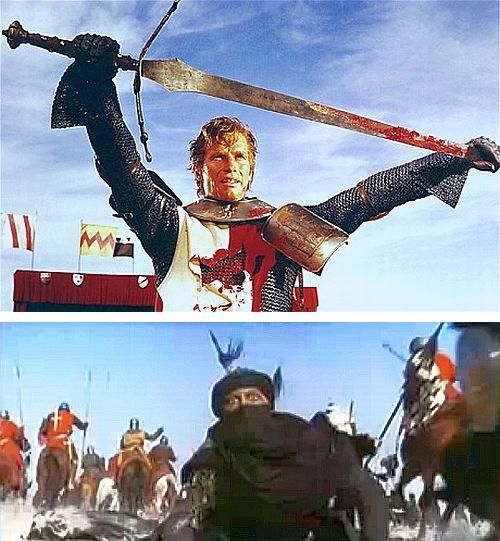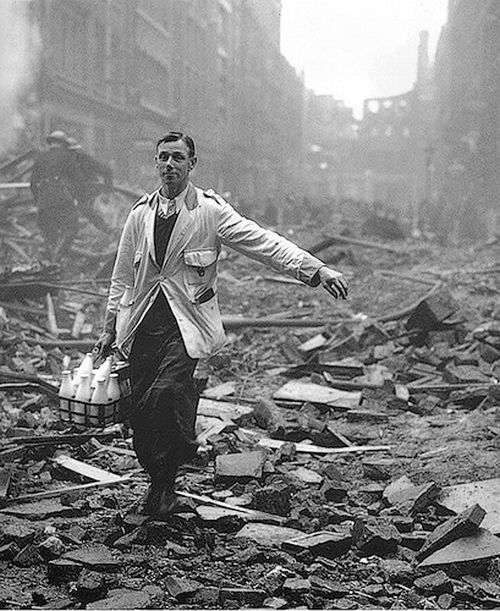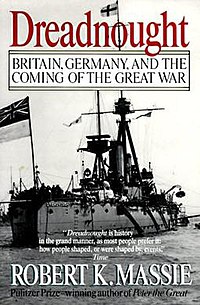Quote:Contrex said: I'm a Brit who works in France near Perpignan and lives over the border in Catalunya which is still part of Spain for the time being.
Good for you mate, tell your Spanish chums we English admire and respect them for kicking the Muslim Moors out of Europe under the leadership of the great El Cid..


@Romeo Fabulini,
Romeo Fabulini wrote:So what?
I'd probably still have refused to go and kill Germans for the Belgians..
If not for the Entente, you might then have had to face Germans on less favorable terms. The prevailing thought was, if left unchecked, the Central Powers would attack Britain. The discovery of the Zimmerman Note seems to verify the global aspirations of Kaiser and friends.
Besides, I thought you loved a good war, Romeo.
@panzade,
panzade wrote:I read a book once, written in 1928 that mentioned the First World War. I wish I could remember what it was called.
Was it referred to as the first? That would be most interesting, considering that World War Three is spoken of in some circles as though a certainty.
Quote:Neologist said: I thought you loved a good war, Romeo.
Only in a good cause!
For examp Hitler sent bombers, flying bombs and rockets across the English Channel to try to disrupt the milk supplies for our tea which was definitely against the Geneva Convention, so we had no choice but to do D-Day to go get him..
 1940 London Blitz, the milk always got through
1940 London Blitz, the milk always got through..


@Romeo Fabulini,
Interesting shape for the milk bottles. Those I remember from the 40s had a constricted neck, whereby upon inserting a plastic ladle shaped device, the contents could be separated and cream drawn off.
@Walter Hinteler,
It definitely was a world war. The consequences of much of it remain unacknowledged today even by reasonably well-educated people. Without going into the melodrama, when Japan finally began to enter the industrial world, they chose the English as their mentors. The navy with which they humiliated the Russians was built in shipyards in Great Britain and purchased by the Japanese. When Great Britain became alarmed at the growth of the German fleet, they cut a deal with the Japanese which traded deals in British shipyards for the Imperial Navy taking over the Royal Navy's responsibilities on the Asiatic station. The cruiser
Izumo, built by Armstrong-Whitworth, sailed to the Pacific coast of Canada at the outbreak of hostilities because German cruisers had been seen off the coasts of Mexico and California. She later joined a Royal Navy battlegroup to hunt down the German cruisers.
Izumo then steamed to Malta to lead a flotilla of destroyers in the Med where they learned anti-submarine warfare from the Royal Navy. The Japanese
quid pro quo was the seizure of German colonies in the Pacific.
Izumo was a part of the Japanese "Six-Six" plan for fiscal year 1897, buying six battleships and six armored cruisers--this at the time of the First Sino-Japanese War. The Great War helped to create the Japanese Empire which the world would have to deal with after 1937.
I would appreciate it if people would stop talking to that jackass Romeo. You're just feeding a troll.
I highly recommend Margaret MacMillan's
Paris 1919: Six Months that Changed the World for an excellent, readable summary of the settlement of the Great War.
Paris 1919 (This should not be construed as an advertisement for Amazon, the link is provided for information purposes only.
World War I could be said to have begun in Sarajevo on June 28, 1914, with the assassination of Archduke Franz Ferdinand and his wife, Sophie, by a young nationalist seeking a greater Serbia. The four and a half years that followed, as the war spread throughout Europe, the Middle East and Asia, reshaped the modern world in fundamental ways.
The war destroyed kings, kaisers, czars and sultans; it demolished empires; it introduced chemical weapons, tanks and airborne bombing; it brought millions of women into the work force, hastening their legal right to vote. It gave independence to nations like Ukraine, Poland and the Baltic countries and created new nations in the Middle East with often arbitrary borders; it brought about major cultural changes, including a new understanding of the psychology of war, of “shell shock” and post-traumatic stress.
It also featured the initial step of the United States as a global power. President Woodrow Wilson ultimately failed in his ambitions for a new world order and a credible League of Nations, setting off much chaos with his insistence on an armistice and his support for undefined “self-determination.” And the rapid retreat of the United States from Europe helped sow the ground for World War II.
Historians still squabble over responsibility for the war. Some continue to blame Germany and others depict a system of rivalries, alliances and anxieties, driven by concerns about the growing weakness of the Austro-Hungarian and Ottoman Empires and the growing strength of Germany and Russia that was likely to produce a war in any case, even if there was some other casus belli.
But the emotional legacies are different for different countries. For France the war, however bloody, was a necessary response to invasion. Preventing the German Army from reaching Paris in the first battle of the Marne spelled the difference between freedom and slavery. The second battle of the Marne, with the help at last of American soldiers, was the beginning of the end for the Germans. This was France’s “good war,” while World War II was an embarrassing collapse, with significant collaboration.
For Germany, which had invested heavily in the machinery of war, it was an almost incomprehensible defeat, laying the groundwork for revolution, revanchism, fascism and genocide. Oddly enough, says Max Hastings, a war historian, Germany could have dominated Europe in 20 years economically if only it had not gone to war.
“The supreme irony of 1914 is how many of the rulers of Europe grossly overestimated military power and grossly underestimated economic power,” Mr. Hastings said, a point he now emphasizes when speaking with Chinese generals. The Germans, too, are still coming to terms with their past, unsure how much to press their current economic and political strength in Europe.
For Britain, there remains a debate about whether the British even had to fight. But fight they did, with millions of volunteers until the dead were mounded so high that conscription was finally imposed in 1916. The memory of July 1, 1916, the first day of the Battle of the Somme — when 20,000 British soldiers died, 40,000 were wounded and 60 percent of officers were killed — has marked British consciousness and become a byword for mindless slaughter.
“The sense that the war was futile and unnecessary still hangs over a lot of the discussion in Britain,” said Lawrence Freedman, professor of war studies at King’s College, London.
In Britain there is also a deep presumption that the generals were incompetent and cold to human sacrifice, that “lions” — the brave ordinary Tommies — were “led by donkeys” like Field Marshal Douglas Haig.
“That was almost certainly true at the start, but not true at the end,” Mr. Freedman said. “But the notion that lives were lost on an industrial scale because generals kept trying to launch offensives for a few feet of ground is widespread.”
In fact, the beginning of the war was mobile and extremely bloody, as were the last few months, when the big offensives of 1918 broke the German Army. The rate of killing in the muck and mud of the trenches was much lower than during the mobile part of the war.
If the inheritance is mixed, the war still casts a long shadow, refracted through what can now seem the inevitability of World War II and our tumultuous modern history. This is also, after all, the 75th anniversary of the start of that war and the 25th anniversary of the collapse of the Berlin Wall.
The end of the Cold War was in a sense a return to the end of World War I, restoring sovereignty to the countries of Eastern Europe, one reason they are so eager to defend it now.
Analysts wonder if the period of American and European supremacy itself is fading, given the rise of China and the return of traditional nationalism, not just in Russia but in the many euroskeptic voters in France, Britain and Denmark.
Inevitably, analogies are drawn. Some analysts compare Germany after the war to Russia now, arguing that just as Germany rejected the “Carthaginian peace” at the end of World War I, so Russia is now rejecting the “settlement” of the Cold War, seeing it as unjust, chafing over its defeat and prompting a new Russian aggressiveness and irredentism.
Some question whether the lessons of 1914 or of 1939 are more valid today. Do we heed only the lessons of 1939, when restraint was costly, and miss the lessons of 1914, when restraint could have avoided the war?
The Battle of Gallipoli was important not only in shaping modern Turkey and Australia, but also New Zealand
American Expat 11 hours ago
This was also perhaps the last war in which, by a noble notion of egalitarianism, elites were sent to the front line next to ordinary...
TH Williams 15 hours ago
I am suddenly reminded of a neighbor, I believe his name was Leo Dawson. A decorated veteran of World War I with lungs scarred for life...
SEE ALL COMMENTS
Some see a continuing struggle between Germany and Russia for mastery of Europe, a struggle that marked both world wars and continues today, and not just in Ukraine, where a century ago its people fought on both sides. Others see World War I, at least as it began in Sarajevo, as the third Balkan War, while the post-Cold War collapse of Yugoslavia and its multinational, multicultural, multireligious model continues to present unresolved difficulties for Europe, in Bosnia, Kosovo and beyond. Similar tensions persist in Northern Ireland, the rump of Ireland’s incomplete revolution that began with the Easter Rising of 1916.
Others point to the dangers of declining powers faced with rising ones, considering both China and the Middle East, where the Syrian civil war and the advance of Islamic militants toward Baghdad are ripping up the colonial borders drawn up in the Sykes-Picot agreement by the French and British, with Russian agreement, in 1916, the middle of the war, when the Ottoman Empire was cracking. The carnage at Gallipoli helped shape the national identity of the inheritor state, modern Turkey, let alone Australia.
Even the Balfour Declaration, which threw British support behind the establishment of a Jewish state in Palestine, was signed during the war, in November 1917.
With the new interest in the centenary, mourners and tourists, schoolchildren and relatives, walk the living battlefields of Ypres, which still turn up human remains and live ammunition. And they walk the finely kept grass between the gray headstones here at Tyne Cot, laying bright red poppies upon the earth.
The poppy is one of the most obvious inheritances of the Great War — made famous in the 1915 poem by a Canadian military doctor, Lt. Col. John McCrae: “In Flanders fields, the poppies blow, between the crosses row on row, that mark our place…” The short poem was written as a eulogy and a call to solidarity from the dead to the living, that they not “break faith with us who die.”
Not far away is the tiny Flanders Field American Cemetery and Memorial, an exquisitely kept six acres containing only 368 graves, including 21 unknown, while the names of 43 more, missing in action, are carved on the walls of a small chapel.
If Tyne Cot is the largest military cemetery for the Commonwealth, this is the smallest American military cemetery. The headstones tell the stories of first- and second-generation Americans, their names redolent of the Europe their parents left to make a better life, who returned here to die. Like Giuseppe Spano, a private from Pennsylvania, and Angelo Mazzarella, a private from West Virginia, and Emil P. Wiser, a private from Montana, and Ole Olson, a private from Wisconsin, and John Dziurzynski, a private first class from Ohio.
“The dead were and are not,” the historian G. M. Trevelyan wrote in his autobiography. “Their place knows them no more and is ours today. Yet they were once as real as we, and we shall tomorrow be shadows like them.”
A version of this article appears in print on June 28, 2014, on page A1 of the New York edition with the headline: A Conflict That Shaped the Modern World. Order ReprintsToday's PaperSubscribe
Quote:Setanta said: I highly recommend Margaret MacMillan's Paris 1919: Six Months that Changed the World for an excellent, readable summary of the settlement of the Great War.
Haven't you got a mind of your own mate?
We don't need a book to tell us what everybody already knows, namely that the warmongering krauts invaded France to grab Paris, but got their asses kicked..

WWI was inevitable according to author Robert K Massie in his thorough study of the build-up in naval strength by England and Germany.

His follow-up: Castles Of Steel outlines the Naval battles through 1918.
One of the greatest history books ever written, if one wants to understand the causes that led to the Great War.

@Setanta,
Setanta wrote:I would appreciate it if people would stop talking to that jackass Romeo. You're just feeding a troll.
And allow implied approval of his posts?
@Setanta,
Very instructive thread. Thanks for posting
Setanta's been an A2K member for 12 years and has made over 78,000 posts, but his spiritual evolution has been at a standstill all that time so he's a classic example that Evolution doesn't happen.

@neologist,
That's a defensible position. Anyway, sometimes you just can't help it.
@Romeo Fabulini,
Romeo Fabulini wrote:Setanta's been an A2K member for 12 years and has made over 78,000 posts, but his spiritual evolution has been at a standstill all that time so he's a classic example that Evolution doesn't happen.(smarmy emoticon removed)
Setanta and I may have very few points of agreement. But one thing is certain. He is light years ahead of you in the Stanford Binet.
@roger,
roger wrote:That's a defensible position. Anyway, sometimes you just can't help it.
Rats! You say the nicest things. . .
@Setanta,
The after effects from the Vietnam War is still being suffered by the people of Vietnam - many from Agent Orange. The Remnants Museum is Saigon tells the story very well with pictures. One had me near tears; a deformed baby smiling with his mother.
@Walter Hinteler,
Interesting map, Walter. Thanks for sharing; it shows how involved many countries were in that war.